Last Updated on December 19, 2022 by Gaga
The centuries-old practice of using natural oils for beauty purposes is back in trend. And for good reason: natural oils have many proven benefits in addition to simply moisturizing your hair. Using natural oils reduces exposure to harmful chemicals you can find in hair care products. Unrefined hair oils don’t contain artificial ingredients while retaining their nutritional value. Their natural ingredients don’t pose a risk to your health or harm the environment.
Hair oils can help compensate for the lack of natural oils that have been lost due to over-shampooing, chemical processing, and frequent heat styling.
You can use hair oils as an overnight mask, hot oil treatment, pre-shampoo treatment, or as a leave-in conditioner. You can also add them to your shampoo, conditioner, or styling creme for an added boost of moisture.
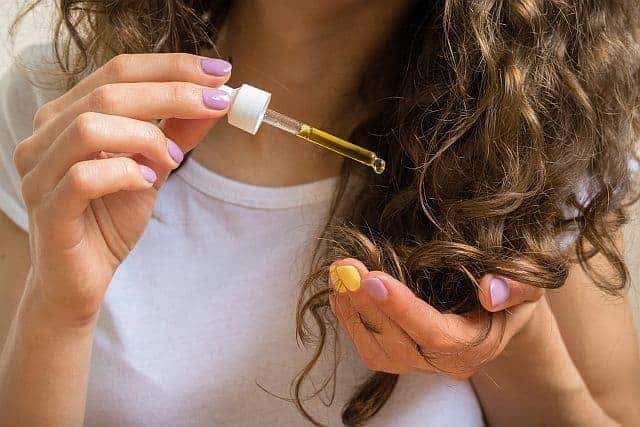
Light Oils vs. Heavy Oils
Lightweight hair oils penetrate the hair shaft quickly without leaving your hair feeling greasy or weighed down. Due to their small molecular structure, those light oils penetrate the hair more deeply, while heavy oils just sit on the top of your hair.
Lighter oils work great for any hair type, but they are especially suitable if you have fine hair that lacks volume and bounce.
Related article
1. Argan Oil for Damage-Free Hair
Argan oil, also known as Moroccan oil, is derived from nuts contained in the fruit of the Argania Spinosa tree. Known as “liquid gold,” this oil is rich in essential fatty acids, antioxidants, and vitamins A and E, which work together to keep your locks healthy.
Hair types that may benefit from the use of argan oil:
Weak and damaged hair: Studies have shown that argan oil can decrease damage caused to the hair shaft by using permanent dyes. With regular use, argan oil helps to heal damaged hair and reduce breakage and split ends. As a pre-shampoo treatment, leave argan oil in the hair for at least one hour before shampooing.
Frizzy, coarse hair: Argan oil coats the hair shaft, which helps prevent frizz and static and adds a mirror-like shine. This oil improves hair softness and manageability and is a favorite hair oil for people with frizzy, coarse, and unmanageable hair. It especially helps with detangling curly hair and makes the curls shiny and bouncy. After a shower, rub a few drops of oil into the palms of your hands, then run your fingers through your hair and massage the oil into your scalp.
Dry scalp and dry hair: This oil is the perfect moisturizer for dry, processed, and damaged hair. Argan oil seals in the cuticles to increase moisture retention inside the hair. It adds a nice shine to lackluster hair without leaving it feeling oily. To reduce frizz and tame flyaway hair, apply a couple of drops to the ends of your hair.
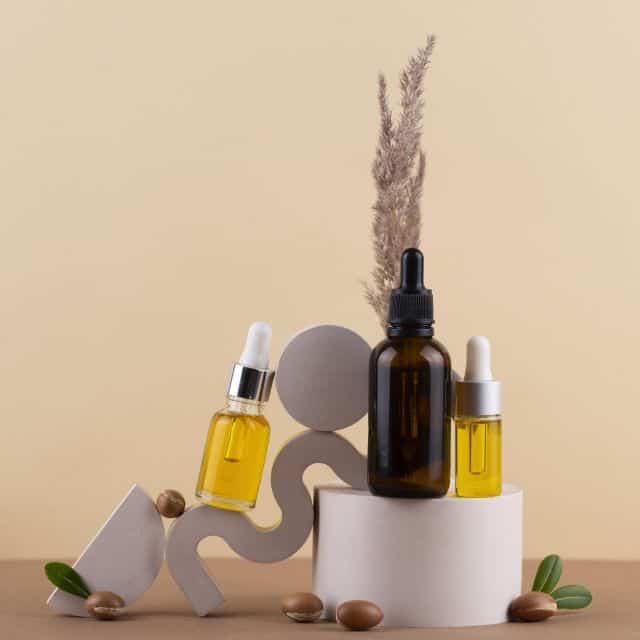
Argan oil conditions a dry scalp and helps decrease inflammation and oxidative stress. It helps reduce flaking caused by dry scalp conditions and is gentle enough to be used on sensitive scalps.
2. Jojoba Oil: Closest to the Human Sebum
Jojoba oil is extracted from the seed kernels of the jojoba plant. This golden-yellow liquid has similar properties to human sebum. It is rich in monounsaturated liquid wax esters, vitamins E and B, and minerals that prevent oxidative stress and keep the skin and hair healthy.
What Hair types will benefit from the use of jojoba oil?
Dry hair: This lightweight oil improves hydration, which makes it a great treatment for dry hair. It minimizes frizz and adds shine to lackluster hair without weighing it down.
Oily scalp and dry hair: Due to its sebum-balancing properties, jojoba oil has beneficial effects on both dry and oily hair. It hydrates dry ends while, at the same time, dissolving any excess sebum and inhibiting hyperactive oil glands.
Damaged hair: Jojoba oil fill in the cracks in the hair shaft to prevent further damage and split ends. It strengthens your strands, mends split ends and stops excessive hair breakage.
Dandruff-prone hair: Antimicrobial and healing properties of jojoba oil reduce scalp inflammation. In addition, it helps clear clogged pores, soothes a dry, flaky scalp, and keeps dandruff under control.
3. Grapeseed Oil: The Lightest Hair Oil
Grapeseed oil is extracted from grape seeds, the byproduct of the wine-making process. This oil is loaded with beneficial fatty acids, vitamins A, E, K, B6, and antioxidants that keep hair healthy. Just make sure to store it away from light and heat!
Hair types that will benefit from the use of grapeseed oil:
Dry, frizzy hair: Natural conditioning agents in grapeseed oil moisturize and condition dry strands, making hair stronger, healthier, and shinier. If you have fine hair that lacks moisture, this lightweight oil will deliver it without weighing your locks down. It will also help prevent frizz and split ends.
Dandruff-prone hair: Hydrating, anti-inflammatory, and antimicrobial properties make this oil a great scalp conditioner and effective remedy for dandruff caused by dry scalps.
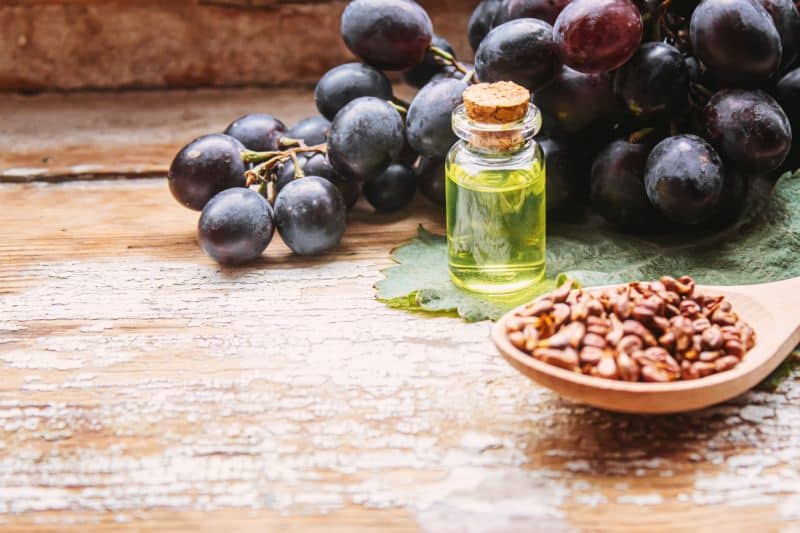
Thinning hair: Grapeseed oil can decrease the production of DHT, a hormone that causes hair loss. It also helps boost blood circulation in the scalp area, which may positively affect the functionality of hair follicles. This light hair oil won’t make thinning hair look too heavy.
4. Rosehip Seed Oil: Best Anti-Aging Moisturizer
Rosehip oil is extracted from the crushed seeds of wild rose bushes. Rich in essential fatty acids, vitamins A, C, and E, and Lycopene, this oil has potent antioxidant and regenerative properties.
What Hair types will benefit from the use of rosehip oil?
Dry hair: Rosehip oil keeps hair hydrated and prevents damage to hair associated with the loss of natural oils. It nourishes the hair cuticle, tames frizziness, and leaves hair soft and silky.
Dry scalp: Absorbed almost immediately, rosehip oil moisturizes the scalp to prevent scalp flaking and dandruff.
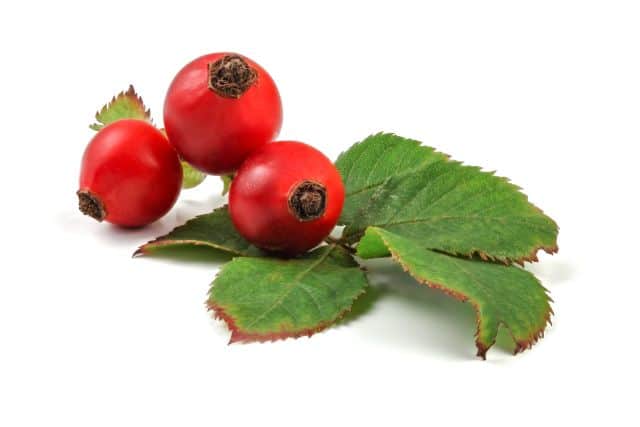
Thinning hair: Rosehip oil dissolves the excess build-up on your scalp, unclogs hair follicles, and revitalizes scalp tissue, promoting the growth of healthy hair.
5. Japanese Camellia Seed Oil: Amazing Source of Nourishment
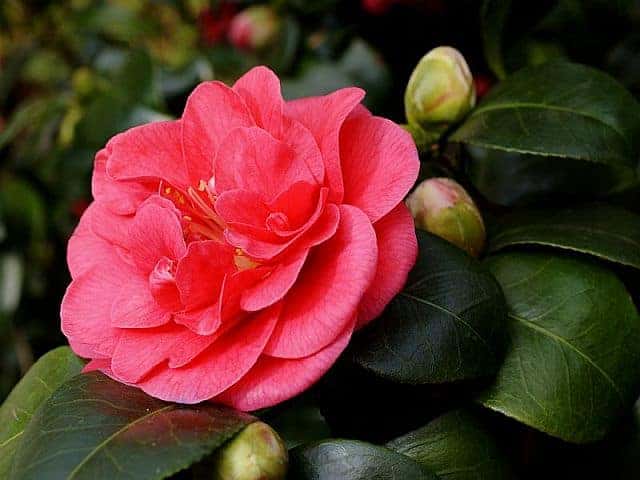
Camellia oil, also known as Tsubaki oil, is obtained from the seeds of the Camellia Japonica tree, which is native to southern Japan. It contains high amounts of fatty acids, vitamin E, and anti-aging polyphenol antioxidants.
Hair types that will benefit from the use of camellia oil:
Dry, lackluster hair: Camellia oil helps to seal moisture into dry strands, making hair softer and more manageable. Its non-greasy formula restores natural shine to hair without leaving an oily layer. This helps your hair look bouncier than when using most other oils.
Unmanageable hair: Camelia oil seals the cuticle and decreases the roughness and excessive porosity that causes friction. This not only makes hair easier to comb and style, but also minimizes the appearance of frizz.
Thinning hair: Camellia oil moisturizes the scalp and strengthens the hair follicles, encouraging hair growth. It also balances sebum secretion, soothes irritation, and keeps dandruff at bay.
6. Marula Oil for Youthful-Looking Glow
Marula oil is extracted from the nuts and kernels found in marula fruit trees. This African oil is rich in fatty acids, vitamins C and E, and flavonoids responsible for healthy and youthful hair.
What Hair types may benefit from the use of marula oil?
Dry, frizzy, or brittle hair: Marula oil assists in moisture retention and boosts hair elasticity, resulting in less breakage. It also heals and smooths damaged cuticles and helps control frizz.
Aging hair: Marula oil can enrich the hair follicles and supply them with oxygen and vitamin C. This stimulates collagen synthesis inside the cells and slows down hair aging processes.
Scalp problems: The antimicrobial properties of marula oil can keep the scalp healthy. Massaging the scalp with marula oil soothes dry, irritated skin, and reduces dandruff.
7. Sweet Almond Oil: Head to Toe Nourishment
Sweet almond oil is derived from crushed seeds of edible almonds that come from the Prunus Amygdalus Dulcis tree. Sweet almond oil is a good source of oleic acid and vitamins A, B, D, and E. It has emollient, regenerating, and anti-inflammatory properties.
Hair types and scalp conditions that may benefit from the use of sweet almond oil?
Dry hair and dry scalp: As a lightweight oil, it can be used to fight dryness without weighing hair down. It seals moisture, boosts hair elasticity, and prevents breakage and splitting. It conditions scalp tissues and relieves dryness, itching, and dandruff.
Dull, lifeless hair: Sweet almond oil helps bring overprocessed hair back to life, soften the texture, and restore its natural shine and beauty.
Thinning hair: Massaging your scalp with almond oil 3-4 times per week improves blood circulation and infuses cells with biotin, promoting stronger, thicker, healthier hair.
8. Avocado Oil: A Versatile Gift from Nature
Unlike other oils that are derived from seeds, avocado oil is extracted by pressing the pulp of an avocado. This oil is rich in healthy fatty acids, vitamin D, and magnesium. Its lightweight formula rapidly absorbs into the skin and hair.
What hair types will benefit from the use of avocado oil?
Fragile, dry hair: Avocado oil helps to seal moisture inside the hair. It conditions and strengthens dry, brittle, and damaged strands, reducing hair breakage and enhancing shine.
Thinning hair: Magnesium present in avocado oil penetrates deep into scalp pores and stimulates hair follicles, encouraging healthy hair growth.
Dry, flaky scalps: The healing and antimicrobial properties of avocado oil help combat inflammation and dryness, keeping the scalp healthy.
9. Moringa Oil for Long-Lasting Color
Moringa oil is obtained from the seeds of the Moringa Oleifera tree through a cold-pressing process. The chemical composition includes fatty acids, vitamins E, B, and C, and antioxidants with skin- and hair-rejuvenating properties.
What hair types will benefit from the use of moringa oil?
- Dry, dull hair: Moringa oil helps to keep keratin and moisture inside the hair, fights split ends, and promotes smoothness and shine.
- Color-treated hair: Rich in antioxidants, this oil can protect the hair from harmful UV rays and prevent color fading.
- Flaking scalp: Antimicrobial and moisturizing properties of Moringa oil work to relieve dry and inflamed scalps and fight dandruff and flaking.
10. Baobab Oil: Moisturizer from the Tree of Life
Baobab oil is derived from the kernel of the baobab fruit. The baobab tree often called a “Tree of life” grows in dry climate locations throughout Africa. Rich in vitamin E, Vitamin A, fatty acids, and antioxidants, this non-greasy oil is a wonderful moisturizer for both hair and skin.
What Hair types will benefit from the use of baobab oil?
Dry, brittle hair: When used as a hair mask, baobab oil helps improve moisture retention in hair that is prone to dryness and improves the elasticity of weak, brittle strands.
Damaged hair: This oil penetrates the hair strands to prevent and repair the damage, making your hair feel soft and silky. It also adds volume and gives a healthy shine to hair.
Dry scalp: Baobab oil absorbs deeply into the scalp. When used as a hot oil treatment, it conditions the scalp and relieves dandruff and itchiness.

Gaga is a blogger and founder of the Softer Hair website. She often says that insomnia is to blame for her first blogging attempts. Being the night owl, she hated the morning alarm. She left her office job and returned to what she loved most - writing.

